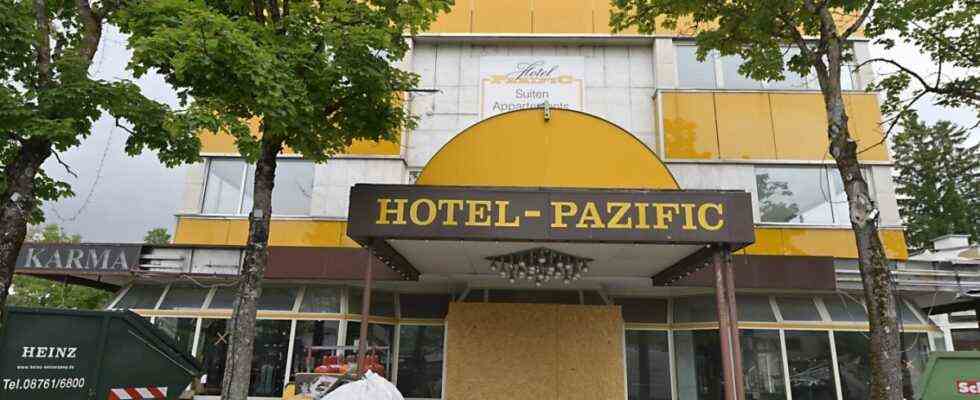The former Hotel Pazific in Ottobrunn has been vacant for more than two years. Now there are craftsmen at work. The background is: The district office wants to accommodate refugees there, so the building is now being prepared. Mayor Thomas Loderer (CSU) is annoyed by the authority’s approach, as it contradicts the town’s urban planning plans.
The former hotel on Rosenheimer Landstrasse was sold a few years ago. The agreement between the municipality and the then new owner was to “make high-quality urban planning,” says Loderer. “We wanted this prominent place to be built in an orderly manner.” Specifically, business premises and apartments above would have been planned on the ground floor, as befits the character of the area. To this end, the municipality had changed the local development plan and granted the owner more building rights. The idea was that 30 percent of the increase in building rights would be offered to the community as inexpensive living space. “It was an urban development concept that we were happy about,” says Loderer. “It was typical and successful for the area.”
But now it will turn out differently. Because as Loderer says, the building has meanwhile been sold again. “The new purchaser is not interested in the plans at that time.” There is talk of a 15-year rental agreement with the district office. Christine Spiegel, the press spokeswoman for the district office, asks for your understanding that she cannot provide any information on contractual matters. “He bought an old cow that the District Office now feeds and that is milked regularly,” says Loderer, annoyed by the new owner. That seems to be a business model.
The former hotel is currently being converted to accommodate refugees. Tea kitchens are being built in the former hotel rooms, ventilation systems are being installed in the bathrooms, and new flooring is being laid, according to the district administration. According to the district office, around a hundred people should find space there one day, but that can only be said exactly after the renovation work is complete. Where the people will come from is also still open. The district office currently assumes that both people who already live in the district and newcomers will find accommodation here. This depends, among other things, on the allocations by the government of Upper Bavaria. According to the district office, the first people will move in this autumn at the earliest.
The workers are already at work: the Hotel Pazific is history. The refugees should move in there in autumn at the earliest.
(Photo: Claus Schunk)
The district is obliged to provide places for refugees according to its size. According to information from the district authority, there are also many people living in the district’s accommodations who already have residence status but have not yet found an apartment on the housing market. In the worst case, they would become homeless and the communities would then have to accommodate them. “This is exactly what the district would like to avoid and is therefore constantly trying to acquire new accommodations in order to meet its obligation to provide newcomers with accommodations,” says the spokeswoman for the authorities, Spiegel. The district and the municipalities have agreed to base the number of places per municipality on the number of inhabitants as much as possible. “There are only a few people in Ottobrunn at the moment,” she says.
The district office rejects the criticism of the mayor of Ottobrunn. The municipality of Ottobrunn had always been aware that the district was looking for further suitable accommodation in the municipality. In this case, the owner of the property approached the authority. “The municipality was informed about the intended rental as soon as the government of Upper Bavaria had approved a possible rental and the district then entered into concrete negotiations,” said the district office.
Mayor Loderer confirms that of course he knows that the district office is desperately looking for more accommodation. He also announced that he was informed about the project in February. What annoys him is not the time of the information, as he informed the SZ upon request, but the procedure itself. “The district office is getting involved and is benefiting from a situation in which the community was deceived by the original buyer of the property.” Loderer suspects that he never wanted to implement the plans according to the specially modified development plan, but was only interested in selling the building again. He also criticizes the allocation of refugees based solely on the number of inhabitants. “In the emergency five or six years ago that was fine,” says Loderer.
Mayor Thomas Loderer was hoping for an urban upgrade on Rosenheimer Landstrasse.
(Photo: Claus Schunk)
The municipality of Ottobrunn also helped and made available the gym of the Ottobrunner Gymnasium or temporary apartments in the Josef-Seliger-Siedlung, which were about to be demolished. “But now we have no more buildings that are eligible,” says the mayor. It also depends on the structure of a community. Ottobrunn has the third largest population in the district, but the smallest area. Loderer sees a failure in politics. “Apparently after six years the state has still not found a better way of managing the refugee issue,” he criticizes.
The surrounding residents are not happy either. One resident complains that the character of the area is severely impaired by such a long relationship. He would also like to see integration concepts worked out with the respective citizens of the community.

